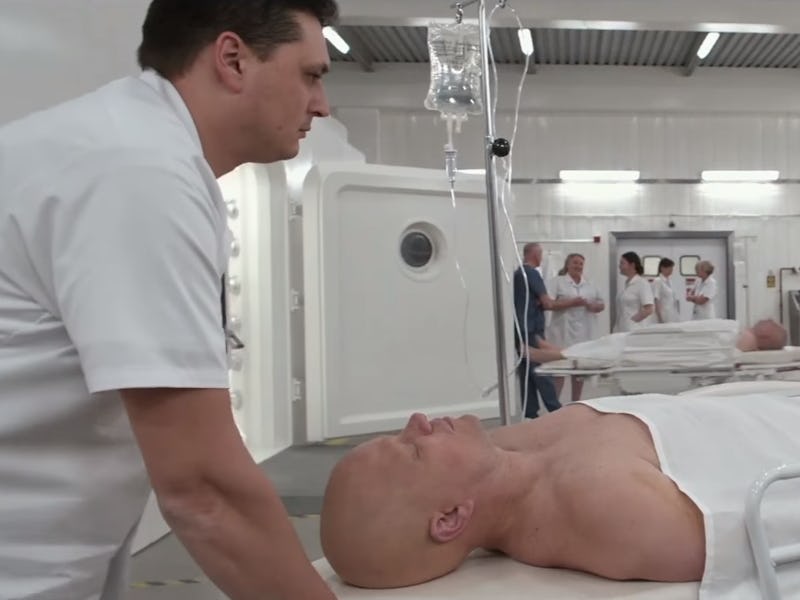Downsizing was ahead of its time — by about five years
Alexander Payne’s sci-fi flop has gone from prescient to downright realistic (with one big exception).

In November 2022, Earth’s population soared past eight billion. Meanwhile, the economy seems to be teetering on the edge of oblivion, the environment is doing even worse, and oppressive world leaders keep pushing the limits of what they can get away with. But what if there was a solution?
In 2017, one sci-fi movie easily identified the problems hurtling toward us and imagined a surprising fix: What if you could shrink yourself down so you were five inches tall?
It may sound absurd, but as Downsizing briskly lays out in its opening scenes, this made-up medical procedure would drastically reduce humanity’s effect on the planet. And, as a bonus, your money goes a lot further when you only have to eat the equivalent of a single M&M per day and your mansion is the size of a shoebox.
Written and directed by Alexander Payne (Sideways, Nebraska) and released five years ago on December 22, 2017, Downsizing was a critical and box office flop, but maybe it was just ahead of its time. While the film remains tonally inconsistent, it’s aged astonishingly well in the half-decade since its debut. Here’s why Downsizing deserves a second shot — or a first one if you missed it.
Downsizing stars Matt Damon as Paul Safrânek, a middle-class American living 10 years after the invention of “Downsizing.” Paul lives an uneventful life with his wife, Audrey (Kristen Wiig), until he learns that his old childhood friend, Dave (Jason Sudeikis), has become a tiny person. Dave reveals that he’s been living like a king in a downsized community called Leisureland, and before too long, Paul and Audrey decide to join him.
That’s where the movie takes its first twist. Audrey changes her mind at the last minute and fails to warn Paul before he undergoes the irreversible procedure. Then she divorces him, taking enough money with her to keep him from living like a tiny king. After moving to a less-impressive apartment in Leisureland and taking a call-center job to pay the bills, Paul meets two people who will change his life: A sketchy party boy played by Christoph Waltz, and a maid named Ngoc Lan Tran, played by Hong Chau.
While Waltz is a diversion, Chau’s character drives the plot as Downsizing’s second half sputters into gear. Ngoc Lan is a Vietnamese activist who was shrunk against her will and imprisoned until she escaped to America. She introduces Paul to the downsized service workers who keep Leisureland running but are forced to live in a slum outside its walls. Eventually, they embark on a journey to Norway to visit the inventor of Downsizing, only to learn that, spoiler alert, the world is still doomed despite his best efforts. It’s a bummer of an ending, but also a (probably) realistic one.
In an interview with The Guardian, Alexander Payne noted that while the science of Downsizing may be totally fictional, plenty of research still went into making the movie. “The technology exists,” he joked back in 2018. “All the patents have been bought by apparel companies.”
He added that, according to some physicists he talked to, shrinking your body would have surprising effects. “You could jump higher and probably live longer, and you could put popsicle sticks on your arms and probably fly a little bit, flap around.” he said. “But I’ve got a movie to make, I’ve got other stuff to think about.”
Five years later, Downsizing is still an imperfect movie. The tone swivels wildly from comedy to drama to romance, and while Payne hints at the more interesting ramifications of the procedure (from anti-Downsizing sentiment to the specifics of the procedure itself), the movie is ultimately more interested in Matt Damon’s personal journey as a white guy who learns how the other half lives than in actually exploring those lives.
Still, where Downsizing might have felt prescient in 2017, it’s approaching surprising levels of realism in 2022. Maybe five years from now we’ll be reading about Payne’s underrated sci-fi movie on smartphones the size of Tic Tacs.
This article was originally published on